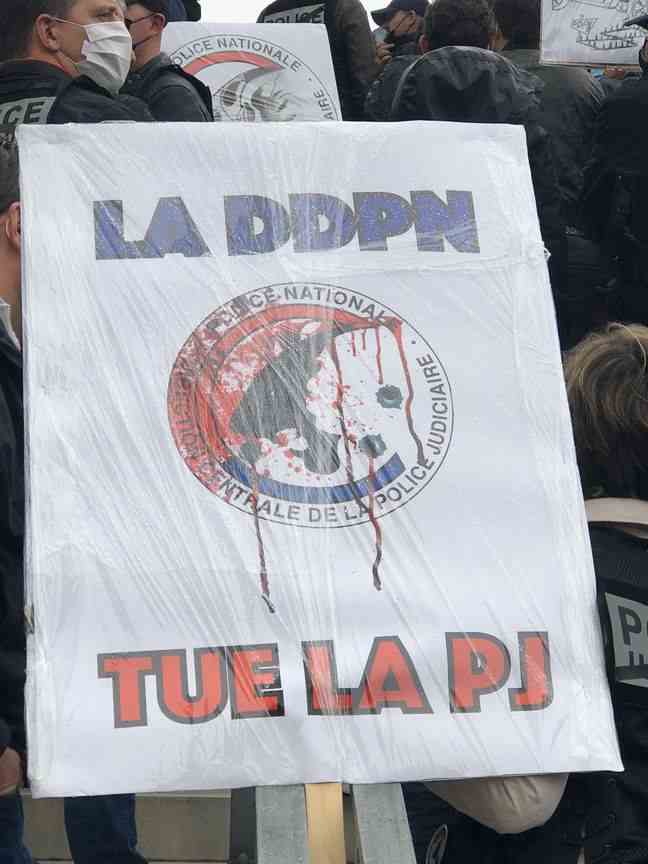“With this reform, it will be necessary to explain to the parents that we could not look for the murderer of their child, because the investigators of the judicial police were busy making traffic”. On the steps of the U Arena, in Nanterre (Hauts-de-Seine), this Monday noon, several magistrates in robes came to swell the ranks of the police demonstration. If the reform of the judicial police primarily concerns the “pijistes”, it also worries the magistrates, who believe that it could “undermine the effectiveness of investigations and the independence of justice”.
Wanted by the Minister of the Interior, Gérald Darmanin, this reform plans to place all the department’s police services – intelligence, public security, border police (PAF) and judicial police – under the authority of a single departmental director. of the national police (DDPN), itself answerable to the prefect. “In a word, it is a question of stopping working in silos at the national and territorial level (…) It is not the police who do their job badly: they are badly organized”, had defended the Minister of Interior, in an interview at Parisianlast October 9.
A loss of specificity
The 5,000 judicial police officers, specializing in serious and complex cases – drug trafficking, homicides, organized crime, disappearances, financial crimes – could, if the reform is adopted, be mobilized for law enforcement missions or public safety. In other words, these ultra-specialized investigators would lend a hand to their colleagues from the departmental security services to deal with burglaries, violence on the public highway or petty trafficking. “If the prefect wants to put these investigators on roundabouts to do traffic or to supervise demonstrations of yellow vests, he can do it”, denounces one of the magistrates, who came to support the 300 police officers gathered in front of the concert hall and who prefer to remain anonymous.
A new organization that Alexandra Vaillant, magistrate and project manager for the Union of Judges (USM), describes it as a waste: “There is a risk of no longer having specialized police officers for long-term investigations. It’s a huge loss of specificity, ”she warns, placed behind the banner of her union. “Without these police officers, the files would never arrive at the hearing”, adds one of his colleagues next door.
By seconding investigators to public security or law enforcement missions, magistrates also fear that certain complex cases may never be closed. Since the law for confidence in the judicial institution, adopted at the end of 2021, the duration of a preliminary investigation cannot exceed two years. “If you have a complex investigation limited in time and there is no longer any judicial police, it will never be resolved,” laments Alexandra Vaillant.
Reinforcement of the weight of the prefect
On the side of the police, like the magistrates, we denounce the absurdity of a “reform of departmentalization”, a level considered too small to investigate crime which is played out at the regional, national, sometimes even international level. “It’s nonsense. Crime has no administrative border. It does not stop at the limits of a department, ”explains one of the magistrates, who also wished to remain anonymous.

But it is the reinforcement of the weight of the prefect in the investigations which most alarms the magistrature. In a joint press release, the USM, the Syndicate of the Judiciary and the French Association of Instructing Magistrates (AFMI) are concerned that the Departmental Director of the National Police (DDPN) may choose the distribution of resources on “opportunistic criteria”, such as “statistical requirements”, “pressure from elected officials” or according to the “specificity of delinquency local “, to comply with the expectations of the prefect, they warn.
A risk of political interference
The magistrates also fear that the political power will interfere in certain investigations relating to facts of tax fraud, money laundering or embezzlement of public funds which could involve elected officials. “Sensitive investigations will be monitored in real time by the prefectural authority, but also by the Minister of the Interior under whose authority he is”, warned the three magistrates’ unions, who call for respect for the principle of separation of powers.
If the magistrates concede that the agents of the public security must work in collaboration with the elected officials and the local partners, “the judicial police, it, must remain apart to maintain this independence”, explains one of them. “There should be no feedback on the most complex cases, especially those relating to the economy and politics outside of any legal circuit,” he adds.
Last week, the Minister of the Interior conceded a few minor amendments and announced the resumption of discussions in mid-December after an audit, without however calling into question the reform, “courageous and essential”, according to him. It remains to be seen whether the mobilization of the magistrates on Monday will be able to get things moving.

